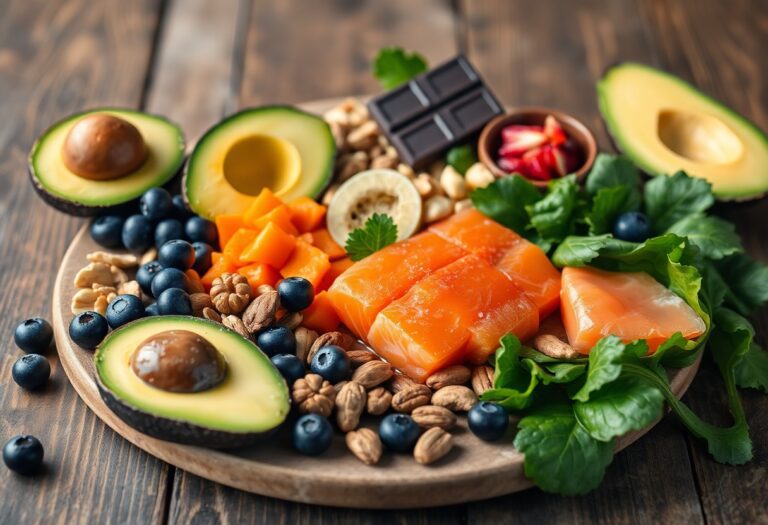Weight loss is a journey that can be challenging, especially during menopause. However, the power of Berberine, a plant-based compound, and its impact on estrogen levels offer promising potential in managing menopausal symptoms, particularly when it comes to combating weight gain. With its ability to enhance glucose sensitivity and influence blood sugar levels, Berberine acts as a skilled captain navigating the stormy sea of weight management. In this guide, we’ll examine into how Berberine can be a game-changer for menopausal women, offering insights on safe incorporation into your daily routine and exploring fascinating clinical research supporting its benefits.

Berberine Unveiled – Types, Sources, and Functions
Some benefits of Berberine have been uncovered through scientific studies. This plant-derived compound has a rich history in traditional medicine, particularly in Chinese and Ayurvedic practices. Its bioactive substances interact with our bodies at a molecular level, showcasing its potential in managing various health conditions.
| Type of Berberine: | Function: |
| Plant Extracted | Used for over 3000 years in traditional medicine |
| Alkaloid | Potent anti-inflammatory and antimicrobial properties |
| Bioactive Compound | Enhances glucose sensitivity and aids in weight loss |
| Golden Yellow | Interacts with estrogen levels |
| Nitrogen Atoms | Impacts menopausal symptoms |
What is Berberine?
Even with its ancient roots, Berberine continues to impress modern researchers. This bioactive compound extracted from various plants, primarily Berberis, has a long history of medicinal use. Its potent anti-inflammatory and antimicrobial properties make it a standout player in managing diverse health issues, showcasing its versatility and effectiveness.
Types of Berberine Supplements
- Plant Extracted: Used in traditional medicine for centuries
- Alkaloid: Shows anti-inflammatory and antimicrobial properties
- Bioactive Compound: Enhances glucose sensitivity and aids in weight loss
- Golden Yellow: Interacts with estrogen levels, benefiting menopausal women
- Nitrogen Atoms: Impacts menopausal symptoms positively
Assume that these types of Berberine supplements offer various advantages tailored to different health needs. Each type holds unique properties that can address specific concerns, making it necessary to choose the most suitable option based on individual requirements and goals.
Estrogen Essentials – Types and Roles
The Role of Estrogen in Women’s Health
With estrogen being a crucial hormone for women’s health, it plays a wide range of roles in the body. Estrogen is responsible for regulating the menstrual cycle, supporting bone health, maintaining vaginal mucosa, and influencing mood and cognitive function. It’s a powerhouse hormone that impacts many aspects of a woman’s well-being.
Different Forms of Estrogen Therapy for Menopausal Women
Some menopausal women may benefit from estrogen therapy to manage symptoms like hot flashes, night sweats, and vaginal dryness. There are various forms of estrogen therapy available, including oral pills, transdermal patches, vaginal creams, and more. Each form has its own pros and cons, so it’s important to work with a healthcare provider to find the right option for your needs.
Synergy for Symptoms – Berberine and Estrogen in Tandem
How Berberine and Estrogen Complement Each Other
Complement: Despite coming from different origins, Berberine and estrogen work hand in hand when it comes to managing menopausal symptoms. Berberine’s ability to enhance glucose sensitivity and impact estrogen levels can be a game-changer for women experiencing weight gain and hormonal fluctuations during menopause.
Synergistic Effects on Menopausal Symptoms
Symptoms: The synergy between Berberine and estrogen offers a powerful combination in managing menopausal symptoms. With Berberine’s role in weight management and glucose balance, coupled with estrogen’s influence on hormone regulation, women can experience a holistic approach to alleviating mood swings, vasomotor symptoms, and other challenges that come with menopause. It’s a dynamic duo that provides a comprehensive solution for women navigating this transitional phase in life.
By combining Berberine’s glucose sensitivity enhancement and estrogen’s impact on hormonal balance, women can find relief from the challenges of menopause in a more holistic way. Berberine’s potential for weight management and blood sugar control, together with estrogen’s role in hormone regulation, creates a powerful synergy that addresses various menopausal symptoms. This tandem approach offers a comprehensive solution for women looking to improve their overall well-being during this life stage.
Berberine – The Glucose Guardian
Step-by-Step Mechanics of Glucose Sensitivity
Now, let’s break down the step-by-step mechanics of how Berberine enhances glucose sensitivity. Check out the table below for a clear understanding:
| Berberine Action | Effect on Glucose Sensitivity |
| Interacts with body at a molecular level | Enhances sensitivity to glucose |
| Regulates insulin levels | Improves glucose utilization |
Berberine’s Role in Insulin Regulation
Glucose regulation is crucial for overall health, and Berberine plays a vital role in maintaining insulin levels. By improving insulin sensitivity, Berberine helps in better utilization of glucose for energy production, supporting overall metabolic function.
Factors Influencing Glucose Metabolism During Menopause
Any fluctuations in estrogen levels, increased abdominal adiposity, and changes in dietary habits can influence glucose metabolism during menopause. These factors can impact insulin sensitivity and blood sugar levels, leading to potential health issues.
- Estrogen levels: Hormonal changes affect insulin sensitivity.
- Abdominal adiposity: Excess fat around the abdomen can lead to insulin resistance.
- Dietary habits: High sugar intake or processed foods can disrupt glucose metabolism.
Weighing the Benefits – Tips for Weight Loss with Berberine
Now, let’s probe how Berberine can be a game-changer when it comes to shedding unwanted menopausal weight.
How Berberine Helps Shed Menopausal Weight
Five: Berberine has shown remarkable potential in aiding weight loss, with some studies reporting an average weight loss of 5 pounds in just 12 weeks when taking 500 mg of Berberine three times a day. This natural compound acts as a skilled sailor navigating the stormy seas of weight gain, making it a valuable asset for women going through menopause.
Pros and Cons of Berberine for Weight Management
| Pros | Cons |
| Effective in aiding weight loss | Potential temporary side effects like upset stomach or nausea |
| Enhances glucose sensitivity | Interactions with certain medications or supplements |
| Can be as effective as pharmaceutical drugs in controlling blood sugar levels | May require consultation with a healthcare provider before use |
While Berberine offers effective weight management benefits, it’s vital to consider potential side effects and interactions with medications or supplements. Consulting with a healthcare provider before incorporating Berberine into your routine can help navigate these factors effectively.
Knowing the pros and cons of Berberine for weight management is crucial in making informed decisions about your health journey.
Estrogen’s Edge – Balancing Hormones Naturally
Step-by-Step Guide to Hormone Therapy
Keep your hormones in check with this step-by-step guide to hormone therapy. Whether you’re considering estrogen replacement or looking for natural ways to balance your hormones, this table breaks down the information you need:
| Step | Description |
|---|---|
| 1 | Consult with a healthcare provider |
| 2 | Discuss potential benefits and risks |
| 3 | Review different hormone therapy options |
| 4 | Monitor hormone levels regularly |
Pros and Cons of Estrogen Replacement
Cons: Considering estrogen replacement? Here are some potential pros and cons to keep in mind:
| Pros | Cons |
|---|---|
| Improved menopausal symptoms | Increased risk of blood clots |
| Reduced risk of osteoporosis | Possible increased risk of breast cancer |
| Enhanced cognitive function | Can cause bloating and breast tenderness |
The decision to pursue estrogen replacement therapy is a personal one and should be made in consultation with a healthcare provider. While it can offer relief from menopausal symptoms and reduce the risk of osteoporosis, it’s important to weigh the potential risks, such as an increased risk of blood clots and breast cancer.
Combining Berberine and Estrogen – Strategies and Tips
To unleash the full potential of Berberine and Estrogen in managing menopausal symptoms, strategic combining is key. Optimal dosages and careful consideration of lifestyle factors can amplify the benefits of these powerhouse compounds. Here are some expert tips to help you navigate this harmonious blend.
Optimal Dosages for Efficacy and Safety
Combining Berberine with Estrogen requires a delicate balance to ensure both efficacy and safety. Starting with a lower dose and gradually increasing it can help your body adjust smoothly. Consult with your healthcare provider to determine the ideal dosage range based on your individual needs and health status.
Dietary and Lifestyle Tips to Enhance Effects
Some women may find enhanced benefits from combining Berberine with Estrogen by incorporating specific dietary and lifestyle strategies. Prioritize a balanced diet rich in fruits, vegetables, and whole grains to support overall health and well-being. Regular exercise and adequate rest can further enhance the effects of these compounds, promoting optimal management of menopausal symptoms while improving glucose sensitivity and supporting weight loss goals.
- Perceiving your body’s response to this combination is crucial
Tips like staying consistent with your supplement routine and maintaining open communication with your healthcare provider can contribute to a successful integration of Berberine and Estrogen into your menopausal wellness plan. Do not forget, these compounds are powerful tools in your health arsenal, so approach their combination with mindfulness and intention.
The Watch List – Interactions and Contraindications
Understanding Interactions with Other Medications and Supplements
Even though Berberine offers a plethora of benefits for menopausal women, it’s crucial to be mindful of potential interactions with other medications and supplements. Berberine may interact with blood sugar-lowering medications like metformin, as well as other supplements such as chromium, alpha-lipoic acid, and magnesium. Therefore, it’s crucial to consult with your healthcare provider before combining Berberine with these substances to avoid any potential adverse effects.
Recognizing Contraindications for Berberine and Estrogen Use
While Berberine and estrogen can provide significant benefits for menopausal women, it’s important to recognize potential contraindications for their use. Some individuals may experience temporary side effects such as an upset stomach, nausea, constipation, and cramping when they start taking Berberine. It’s crucial to be aware of these potential side effects and consult with your healthcare provider if they persist or worsen. Additionally, individuals with certain medical conditions or who are pregnant or breastfeeding should avoid Berberine and estrogen supplements to prevent any adverse effects on their health.
User Experiences – The Pros and Cons According to Reviews
After diving deep into the benefits of Berberine and Estrogen for menopausal women, let’s take a look at real user experiences. Hearing from those who have tried these supplements firsthand can provide valuable insights into their pros and cons.
| Pros | Cons |
| Positive impact on weight management | Potential side effects like upset stomach or nausea |
| Improved glucose sensitivity | Temporary discomfort like constipation or cramping |
| Support in managing menopausal symptoms | Possible interactions with other medications |
Real-life Benefits from the Menopausal Community
Pros: Many women in the menopausal community have reported significant benefits from incorporating Berberine and Estrogen into their routines. From improved weight management to better glucose sensitivity, these supplements have helped enhance their overall quality of life.
Challenges and Coping: Cons from User Feedback
Cons: While the benefits are clear, some users have experienced challenges when taking Berberine and Estrogen. It’s important to be aware of potential side effects like upset stomach or interactions with other medications. However, with proper guidance and monitoring, these cons can be effectively managed.
Your Progressive Plan – A Step-by-Step Approach to Implementing Berberine and Estrogen
Many menopausal women may benefit from incorporating Berberine and Estrogen into their routine. By following a step-by-step plan, you can harness the power of these compounds to improve glucose sensitivity and aid in weight loss.
Establishing Your Baseline – Where to Begin
Any journey towards better health starts with knowing where you stand. Take stock of your current lifestyle, diet, and health goals. Consider consulting with a healthcare provider to establish a baseline and determine the right approach for you.
Progressive Steps to Integrate Supplements into Your Life
Life is all about progress and growth. Once you have your baseline established, it’s time to start incorporating Berberine and Estrogen into your daily routine. Start with small steps, such as including Berberine with meals and gradually increasing the dosage as advised by your healthcare provider.
Steps: Ensure you choose a reputable brand for high-quality supplements. Start with a lower dose and gradually increase it. Monitor your progress and consult with your healthcare provider regularly to make any necessary adjustments. Recall, consistency is key to seeing positive results!
Final Thoughts
Summing up, the synergy between Berberine and estrogen holds immense potential for improving the quality of life for menopausal women.
With Berberine’s ability to enhance glucose sensitivity and impact estrogen levels, it serves as a valuable tool in managing menopause symptoms, particularly weight gain.
By incorporating Berberine into your routine, along with maintaining a balanced diet, regular exercise, and ample rest, you can navigate the menopause journey on your terms.
Keep in mind, Berberine is not a magic wand but a companion on your path to health and wellness.
So, embrace the benefits, consult your healthcare provider, and take charge of your menopausal transition with confidence and vitality.
Frequently Asked Questions
Q: What is Berberine and how does it benefit menopausal women?
A: Berberine is a bioactive compound extracted from plants like the Berberis group. It offers benefits for menopausal women by enhancing glucose sensitivity, managing weight gain, and impacting estrogen levels.
Q: How long has Berberine been used in traditional medicine?
A: Berberine has been a star player in traditional Chinese and Ayurvedic medicine for over 3,000 years, known for its anti-inflammatory and antimicrobial properties.
Q: What are the potential side effects of taking Berberine?
A: Possible side effects of Berberine include an upset stomach, nausea, constipation, and cramping. These are usually temporary and tend to fade as the body adjusts.
Q: How should Berberine be incorporated into a daily routine?
A: Berberine is best taken with meals, as it works effectively when paired with dietary glucose. A common dosage is 500mg two to three times per day. Consult a healthcare provider before starting.
Q: Are there any interactions to be aware of when taking Berberine?
A: Berberine may interact with blood sugar-lowering medications like metformin and supplements such as chromium, alpha-lipoic acid, and magnesium. It’s crucial to discuss with a doctor before combining these substances.





